

|
|
|
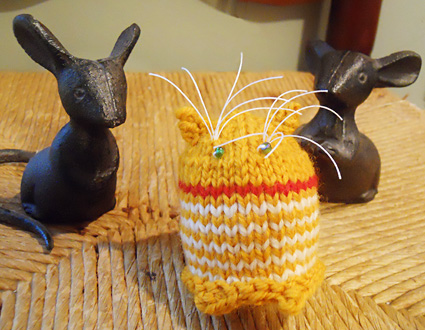
Egg cozies fit over a boiled egg to keep it warm. These are shaped like cats. According to light British literature and the BBC, soft boiled eggs, cooked three minutes and served in the shell in a proper egg cup with toast soldiers for dipping, are a mainstay of nursery teas and breakfasts with kippers. Christopher Robin would share an egg with Pooh and Piglet, Bertie Wooster and Bingo Little would stare moodily at an SBE after a night on the tiles, and Miss Marple would have a nice fresh one brought up on a tray. My design process was something like "you could make egg cozies shaped like cats... and the paws could be made with a picot bindoff! And i-cord for the tail!" They are one small step in a fiendish master plan to rule the world by covering small domestic items with knitting. (It's a secret plan. Shh! Don't tell.) The doll house in the photos was built by my grandfather, Carl Jensen, in the late 1930s. The furniture is original. |
||
 |
Tweet
 |
|
|
SIZE |
|
|
FINISHED MEASUREMENTS |
|
MATERIALS 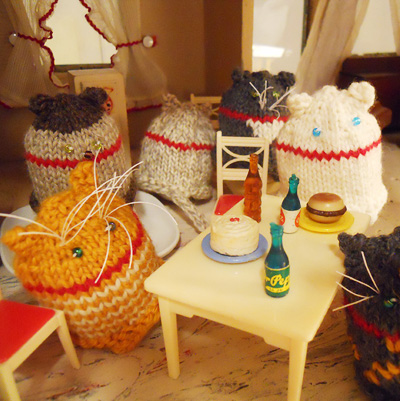 Patons Classic Wool Worsted [100% wool; 210yd/192m per 100g skein]; Stripy cat: Siamese cat: All cats, for collar: Notions |
|
GAUGE |
| 24 sts/32 rounds = 4 inches in stockinette stitch |
|
PATTERN NOTES |
|
A completed Peko Cat takes only about 20 yards of yarn. Note for the Stripey Cat: On this small piece, the "jogless jog" technique for stripes adds bulk without benefit. Nothing bad will happen if you change the striping pattern, but remember to change colors on a knit round, not on the purl round before the feet and tail are worked. |
|
DIRECTIONS 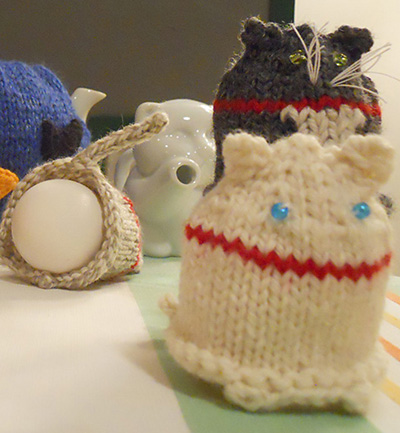
Body 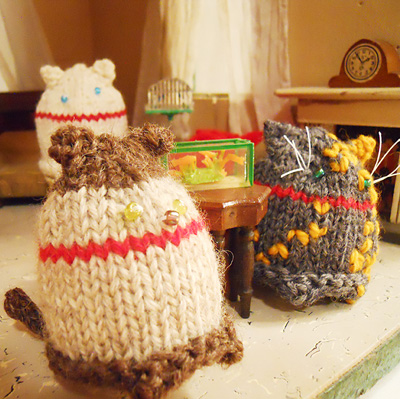 Pull the yarn to the right to begin knitting I-cord tail. Work 12 rows of I-cord. Break yarn, and pull the yarn tail through the live stitches to close off. Weave in all ends. EarsFold the cat flat, so the tail is centered between the paws. Rejoin yarn, and using a single DPN, pick up and knit three stitches, three stitches down from the top of the head, along the folded edge. Knit 3 rows. Body and tail Work as for BASIC CAT, with colors as follows: Work Rounds 1-6 of Body with CC1. Break CC1 and join MC. Work Body through Round 22 with MC (including Round 12 with CC collar). Break MC and join CC1. Work Rounds 23-25 and Tail in CC1. Ears 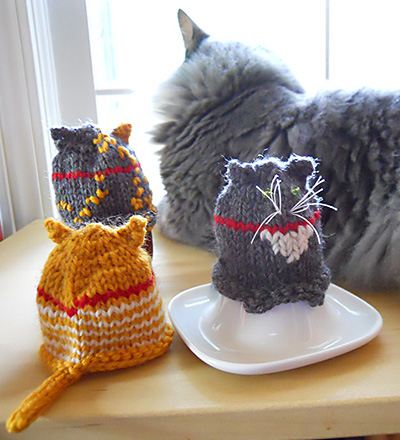 Body and tail Work as for BASIC CAT, with colors as follows: Work Rounds 1-13 with MC (including Round 12 with CC collar). Join CC1 at start of Round 14, and alternate one-round stripes of CC1 and MC to end of Round 23, ending with MC round. Work Rounds 24-26 and Tail in MC. Ears TORTOISESHELL AND TUXEDO CATS
FINISHING Block and weave in ends. If you make an egg cozy that looks like your own cat, your feline overlord may briefly deem you an adequate human. |
| ABOUT THE DESIGNER |
|
|
|
Pattern & images © 2014 Diane Trap. Contact Diane |